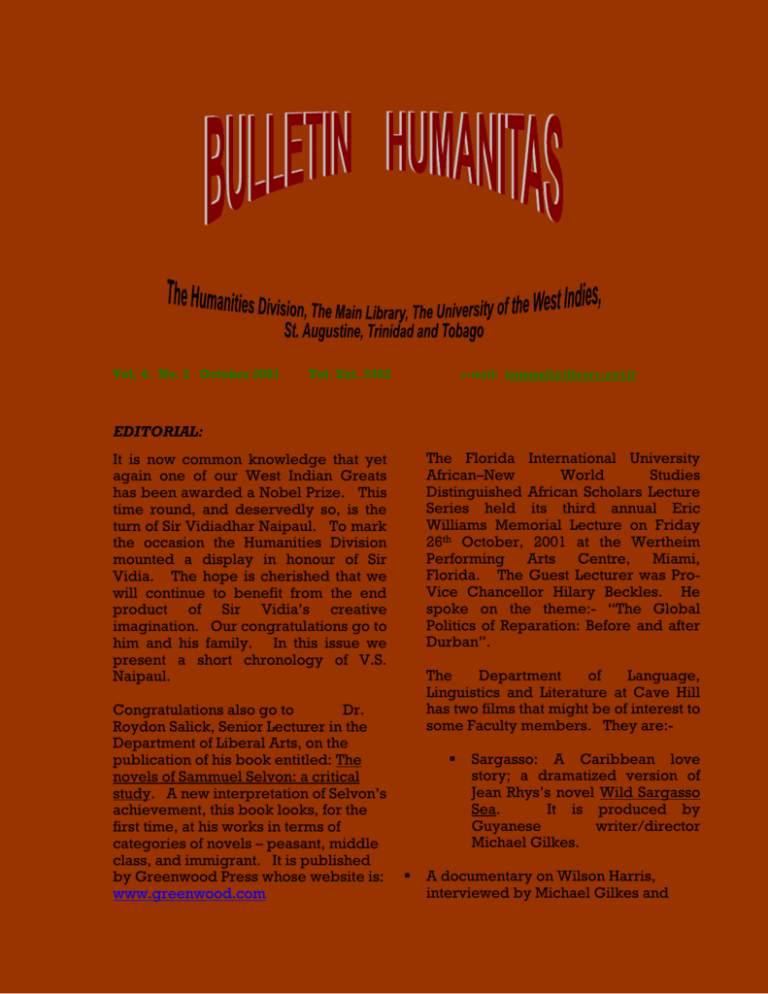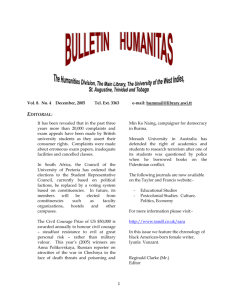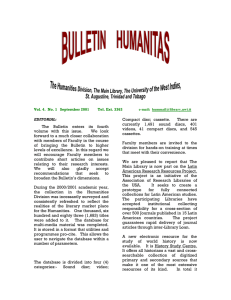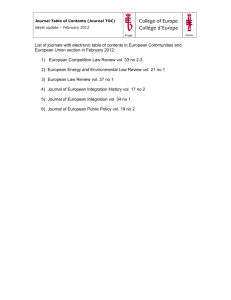October
advertisement

Vol. 4. No. 2 October 2001 Tel. Ext. 3363 e-mail: hummail@library.uwi.tt EDITORIAL: The Florida International University African–New World Studies Distinguished African Scholars Lecture Series held its third annual Eric Williams Memorial Lecture on Friday 26th October, 2001 at the Wertheim Performing Arts Centre, Miami, Florida. The Guest Lecturer was ProVice Chancellor Hilary Beckles. He spoke on the theme:- “The Global Politics of Reparation: Before and after Durban”. It is now common knowledge that yet again one of our West Indian Greats has been awarded a Nobel Prize. This time round, and deservedly so, is the turn of Sir Vidiadhar Naipaul. To mark the occasion the Humanities Division mounted a display in honour of Sir Vidia. The hope is cherished that we will continue to benefit from the end product of Sir Vidia’s creative imagination. Our congratulations go to him and his family. In this issue we present a short chronology of V.S. Naipaul. Congratulations also go to Dr. Roydon Salick, Senior Lecturer in the Department of Liberal Arts, on the publication of his book entitled: The novels of Sammuel Selvon: a critical study. A new interpretation of Selvon’s achievement, this book looks, for the first time, at his works in terms of categories of novels – peasant, middle class, and immigrant. It is published by Greenwood Press whose website is: www.greenwood.com The Department of Language, Linguistics and Literature at Cave Hill has two films that might be of interest to some Faculty members. They are: Sargasso: A Caribbean love story; a dramatized version of Jean Rhys’s novel Wild Sargasso Sea. It is produced by Guyanese writer/director Michael Gilkes. A documentary on Wilson Harris, interviewed by Michael Gilkes and 2 including dramatic reconstructions of excerpts from Harris’s writing in the landscape of Guyana itself. Those interested in acquiring copies of these films should contact Dr. M. Jane Bryce, e-mail:jbryce@uwichill.edu.bb. The society for Caribbean Studies (UK) is awarding a travel bursary, maximum £500, plus full conference fees, to enable an arts practioner/researcher from any part of the Caribbean to present their work at the Society’s annual conference. Applications must be received by January 15th, 2002. For further information please e-mail: s.e.courtman@staffs.ac.uk. R. CLARKE Editor Call No. Subject Area Amount PA Greek/Latin Language and Literature PB, -PE Celtic/Romanic/ Germanic Language PG Russian /Spanish Language Literature PJ,PK Oriental Language and Literature PL African Language and Literature PM Creole/Indian Language PN Literary Criticism, Mass Media PQ French Language and Literature PR English and West Indian Literature PS - PZ American Literature & European Literature Z4- Z8387 Library Science Z Bibliographies Internet Total:- ACQUISITIONS for the month of October totalled 173 TITLES in the following subject areas:Call No. Subject Area AC B-BD; BG-BJ BL-BX CC D-DP DS DT E F L M N P Amount General Information 1 Philosophy Religion Archaeology European History Eastern History African History North American History South/Central America and Caribbean History Education Music Visual Arts Linguistics 5 7 4 4 6 7 5 25 19 4 5 - 5 3 9 13 22 8 19 2 ZA 173 ▒▒▒▒▒▒▒▒ Interesting TITLES included: Alive at the core. Exemplary approach to general education in the Humanities /by Michael Nelson and Associates, 2000 “The Humanities core is back from the dead. Indeed, it is vibrant at increasing numbers of institutions that take seriously, and not just as a cliché, what it means to prepare students for ‘living in the twentyfirst century’.” [Call No.: AZ 183.US A45 2000] 3 Caste and Class in India in the late 20th Century/ by Solomon Selvam, 2000. “Seeks to highlight some of the most complex, historical issues of a traditional and changing society, the confluence of caste and class forces in India.” “Whilst there are numerous histories of Europe since 1945, few examine the continent from a mainly ethnic perspective. The coverage encompasses all categories of minorities including immigrants and refugees, localized ethnic groups and dispersed peoples.” [Call No.: DS 422.C S355 2000] Chinese Literature in the second half of a modern century. A critical survey /edited by PangYuan Chi and David Der-Wei Wang, 2000 [Call No.: D1056. P36 2000] “The first attempt of its kind, this book features the work of renowned scholars from China, Taiwan, Hong Kong and other overseas Chinese communities. The fifteen essays herein represent fifteen entry points to the complex network of Chinese literature since 1949.” Colonial Latin America 4th edition / by Mark A. Burkholder and Lyman L. Johnson, 2001. “Provides a concise study of the history of Iberian colonies in the New World from their preconquest background to the wars of independence in the early nineteenth century.” [Call No.: F1412.B96 2001] Novels and the nation. Essays in Canadian Literature / by Frank Birbalsingh 1995. In eighteen essays Frank Birbalsingh “discusses the evolution of Canadian identity and nationhood as reflected, predominantly, in the English fiction of this country, from the writings of the first British expatriates, through the colonial, empire-conscious works of the nineteenth century, to the strongly nationalistic literary consciousness of the mid-twentieth century and finally the contemporary works of a multi-cultural country continuously transforming itself”. [Call No.: PL 2303. C42 646 2000] An ethnic history of Europe since 1945. Nations, states and minorities /by Panikos Panayi, 2000 [Call No.: PR 9192.2.B57 1995] The shape of the Great Pyramid /by Roger Herz-Fischler, 2000. “Starting in the late eighteenth century, eleven main theories were proposed to explain the shape of the Great Pyramid. The theories themselves are examined, not as abstract mathematical discourses, 4 but as writings by individual authors, both well-known and obscure, who were influenced by the intellectual and social climate of their time.” and the press with leaders who helped to change the world.” [Call No.: PN 6122.W66 2000] ▒▒▒▒▒▒▒▒ [Call No.: DT 63.H47 2000] Through a black veil. Readings in French Caribbean poetry / by E. Anthony Hurley, 2000 “An investigation of the diverse poetic manifestations of a sensibility that may be designated as ‘French Caribbean’, through close reading of a representative sample of poems.” New issues of the following JOURNALS contain important and helpful articles: The Cambridge Quarterly Vol. 30, No 3, 2001 In this issue you will find: - “Symbolisation compulsions: Freud, African Literature and South Africa’s process of truth and reconciliation” by Ato Quayson - “Whatever happened to pleasure?” by Susan Manning - “Not with a bang but a whimper: Lucy Clifford’s correspondence, 1919-1929” by Marysa Demoor [Call No.: PQ3942.H87 2000] Understanding Othello. A student casebook to issues, sources and historical documents / by Faith Nostbakken, 2000. “By combining primary documents with commentary, this guide considers many theatrical, cultural, social, and political concerns at the core of Othello.” [Call No.: PR 2829.N65 2000] Women at the podium. Memorable speeches in history/ by S. Michele Nix, 2000. “From the battlefield and the pulpit, before cameras and vast crowds, women have long shaped history with powerful, impassioned words. Women at the podium pairs issues of war, patriotism, social justice, women’s rights, religion, politics, [Call No. PN 80 C178 Q1] French Studies Vol. LV, No. 3, July 2001. In this issue you will find: - “Du discours insolite: le discours indirect sans que” by Sophie Marnette - “Reflexivity in the Pensees: Pascal’s discourse on discourse” by Emma Gilby - “Diderot’s ‘Promenade Vernet’, or the salon as landscape garden” by Kate E. Tunstall [Call No. PQ1 .F6] 5 International Review of Applied Linguistics in Language Teaching. Vol.39, No.3, 2001 Journal of World History. Vol. 12, No. 2, Fall 2001 - In “Cross-cultural perceptions of piracy: maritime violence in the Western Indian Ocean and Persian Gulf Region during a long eighteenth century”, Patricia Risso defines maritime violence as “indiscriminate seizure of seaborne or coastal property, under threat or use of force,” and then applies the definitions to disputed incidents in the Arabian Sea and Persian Gulf region. - Sheldon Watts identifies a sharp shift in cholera policies in British India in “From rapid change to stasis: official responses to cholera in British-ruled India and Egypt, 1860-1921.” In this issue you will find:- “Investigating learner vocabulary: a possible approach to looking at EFL/ESL learners’ qualitative knowledge of the word.” By Eric T.K. Liu and Phil M. Shaw - “Where have the prepositions gone? A study of English prepositional verbs and input enhancement in instructed SLA” by Rong-Rong Kao - “From Linguistics to communications didactics: the case of lexicology” by Bertrand Labasse [Call No. P5.I5] The Journal of Asian Studies Vol. 60, No. 2, May 2001 In this issue you will find:- “Samurai status, class and bureaucracy: a historiographical essay” by Douglas R. Howland - “Genesis of marriage among the Moso and empire-building in late imperial China” by ChuanKang Shih - “The marginalisation of a Dalit martial race in late nineteenth and early twentieth-century Western India” by Philip Constable [Call No. DS1.J86 A8] [Call No. D1.J62] Kunapipi. Journal of post-colonial writing. Vol. XXXIII, No. 1, 2001 This issue is dedicated Rutherford (1932-2001), editor of Kunapipi. - to Anna founding “Sport lay close to the heart of British imperial culture.” Marilyn Reizbaum in “An Empire of good Sports: Roger Casement, the Boer War, and James Joyce’s Ulysses” tells us that “sport is performative in any number of grammatical ways: it is a noun in two senses, not only to do with physical practice but spiritual mettle; it is a verb – the donning of clothing or attitude; it is both 6 adjectivally and characterological;” - nominally “Pauline Johnson [the wellknown Indian poetess] is remembered principally as a recitalist whose stage career was pursued with enormous energy and remarkable good humour, not only throughout Canada, but also in the US and England, during the last decade of the 19th and first decade of the 20th centuries.” So says Ann Collett in E. Pauline Tekahionwake: mistress of her craft.” Modern Language Quarterly. A Journal of Literary history. Vol. 62, No. 3, September 2001 - “What good are newspapers to poets? What good are poets to newspapers?” These are questions that Julie Ellison sets out to answer in “News, Blues and Cowper’s busy world”. - “The secular curriculum Lanson helped to establish promoted a pedagogy that transmitted a set of dispositions toward literature from teachers to students, and the effects of that pedagogy deserve closer scrutiny.” So argues Mark Wolff in “Individuality and l’Esprit Francais: on Gustav Lanson’s pedagogy”. [Call No. PR 9080.A1 K96] Lingua. Vol. III, No.10, October 2001 - - In “Concealed pseudo-clefts,” Ileana Paul argues that “the Cleft in Malagasy, a western Austronesian language, is best analysed as a (kind of) pseudocleft and that clefts are copular constructions with a headless relative in subject position.” In “Compounding and inflecting language impairment: evidence from Williams Syndrome (and SLI),” Harald Clahsen and Mayella Abmazan tell us that “computational operations from a finite set of (typically) combinatorial mechanisms that may apply recursively and manipulate abstract symbols such as [±V] or grammatical features such as tense, person, number, etc.” [Call No. P1. A1 l755] [Call No. PE1M6] Studies in English 1500 - 1900. Vol. 4, No.3, Summer, 2001. - Nahdini Bhattacharya contends in “ James Cobb, colonial cacophony and the Enlightenment” that “through the lens of postcolonial story telling, we see that Cobb’s tales of colonial reformers anticipate, albeit with different political intent, the ongoing torment of the Enlightenment’s bequest to postcolonial nationality.” - In “Change and fixity in Sense and Sensibility”, Rodney S. Edgecombe tells us that “approaching the topic of trees from several angles, and with an ironised commitment that both endorses and mocks in the 7 breath, Austen all but fulfills a central dictum of the picturesque, viz., that picturesque composition consists in uniting in one whole a variety of parts.” 1960: He begins travels to places such as India, SouthAmerica, Africa, Iran, Pakistan Malaysia, and the US. 1957: The Mystic Masseur. For which he received the John Llewelyn Rhys Memorial prize 1958: The Suffrage of Elivira. 1959: Miguel Street. For which he received the Somerset Maugham Award. 1961: A House for Mr. Biswas (received grant from the Trinidad government to travel in the Caribbean). 1962: The Middle Passage; Impressions of five societies – British, French and Dutch – in the West Indies and South America. 1963: Mr. Stone and the Knights Companion. 1964: An Area of Darkness. 1967: The Mimic Men, a flag on the Island (a collection of short stories). 1968: Receives W.H. Smith Award for The Mimic Men. Caribbean Voices. 1969: The Loss of El Dorado. Marries an English woman – Patricia Ann Hale. 1971: In a Free State (receives Booker Prize, England’s major literary award). [Call No. PR 401 A1 S8] ▒▒▒▒▒▒▒▒ V.S.NAIPAUL A Chronology 1932: Born on August 17th in Chaguanas, Trinidad, to a family of Brahmin origin. His father (Seepersad) was a Journalist (1906-1953). 1943-1948: Attended College Queens Royal 1948: Awarded a Trinidad Government Scholarship. 1950: Attended University College, Oxford, England to study literature. 1953: Graduate form University. Oxford 1954-1956: Broadcaster for the BBC’s 1955: 1957–1961: Regular fiction reviewer for the New Statesman. 1972: The Overcrowded Barracoon and Other Articles. 8 1975: Guerillas. 1977: India: A Wounded Civilization. 1979: A Bend in the River 1980: A Congo Diary; the Return of Eva Peron, the Killings in Trinidad. 1981: 1982: 2001: Among the Believers: Islamic Journey. ▒▒▒▒▒▒▒▒ 1984: Finding the Narratives. 1987: The Enigma of Arrival; A novel in Five Sections. 1989: A Turn in the South. (Knighted by Her Majesty the Queen). India: A Million Mutinies Now. 1993: The first recipient of the David Cohen British Literature Prize 1994: A Way in the World. 1998: Beyond Belief: Islamic Excursions Among the Converted Peoples. 2000: Reading and Writing a Personal Account, Between Father and Son: Family Letters. Half a Life For the month of October, the Library received 54 new books. These include: Two 1990: 2001: Features from the School of Education Library. An Three Novels (The Mystic Masseur, The Suffrage of Elvira, Miguel Street). Centre: Awarded The Nobel Prize For Literature. Challenging violence in schools: An issue of masculinities/Martin Mills. Open University Press, 2001. [Call No. LB 3013.3 M55 2001] Restructuring religious, spiritual and moral education/ Clive Erricker and Jane Erricker. Routledge/Falmer, 2000. [Call No. BL 42 .E75 2000] Science instruction in the middle and secondary schools/Eugene L. Chiapppelta. Merril/Prentice Hall, 2001. [Call No. Q 183. A1 C637 2001] Surviving and succeeding in difficult classrooms/Paul Blum. Routledge/Falmer, 1998. [Call No. LC 4803. G7 B58. 1998] 9 Teaching and learning with ICT in the primary school/edited by Marilyn Leask and John Meadows. Routledge/Falmer 2000. [Call No. LB 1028.5 T382 2000] Thinking and deciding/Jonathon Baron. Cambidge University Press, 2000 [Call No. BF 441 . B 29 200] ▒▒▒▒▒▒▒▒ INTERESTING ARTICLES IN JOURNALS 1. Unified discipline: A school-wide approach for managing problem behaviour. Richard White et al. Intervention Vol. 37, No. 1, Sept. 2001 Teachers are concerned about the growing inclusion of students with emotional and behavioral problems in general education classrooms and the increasing level of diversity common in schools. Proactive, school-wide approaches are considered best practice in addressing the challenge of maintaining discipline. Unified discipline is a promising school wide intervention designed to support administrators, teachers and other school personnel in meeting these needs by establishing unified attitudes, expectations, correction procedures, and team roles. This article explains how to implement unified discipline as a school-wide approach to managing problem behaviour. 2. What teachers need to be/Robert E. Glenn. The Education Digest Vol. 67, No. 1, Sept. 2001 This article gives a checklist of what a teacher must do for effective teaching. The checklist is as follows:exhibit enthusiasm, know your content, be organized, teach actively, show a good attitude, establish successful classroom management, pace instruction, maintain good people skills, communicate clearly, question effectively, differentiate instruction, build success into your class, hold high expectations, create a pleasant atmosphere, be flexible. 3. Transformational leadership in the health promoting school/ Michelle Hornett Orbit Vol. 31, No. 2 2001. The author of this article feels that the leadership skills of a principal has a direct impact on the ‘health’ of the school. She writes “… schools where high levels of teacher turnover and teacher frustration are apparent are also schools where little sense of community exists and where teachers feel overwhelmingly unsupported as individuals or as professionals”. On the other hand, the author feels that a school which has a 10 healthy school climate is invariably run by a transformational leader – a leader who shares a vision of the school with staff and students, treats all with respect and care, establishes a relationship with staff and students, supports teachers and their goals and always has a listening ear. 4. Mentoring taps talents Education Update Vol. 43, No. 6 Sept, 2001 This article looks at student/adult mentoring. It examines the benefits of such programmes claiming that “school-supported mentoring is a success-based strategy to help young people develop selfesteem and personal growth”. ▒▒▒▒▒▒▒▒ Things of Interest to Teachers and Educators WEBSITE OF INTEREST hptt://www.4teachers.org This site provides a space where educators can encounter new ideas about technology’s role in education, express their opinions and share experiences, get and give moral support, and be inspired and educated by other teachers’ narratives about using technology in educational settings hptt://www.copyrightcentral.org For those interested in copyright laws, this website gives general information. DISPLAYS The Library continued its “Hot Topics” display for the month of October. Books were displayed on the following topics:- Education and Technology, Professional Development, Curriculum and Home/School Relations. The Library also did a display on the life and works of V.S. Naipaul, to commemorate his award of the Nobel Prize for Literature, 2001 OTHER INFORMATION The Editorial Committee of Caribbean Curriculum is once again calling for articles for its next issue to be published in 2002. Interested persons can contact the Librarian/Documentalist of the School of Education at 662-2002 Ext.3338. Janet Fullerton-Rawlins (Mrs.) Librarian/Documentalist






